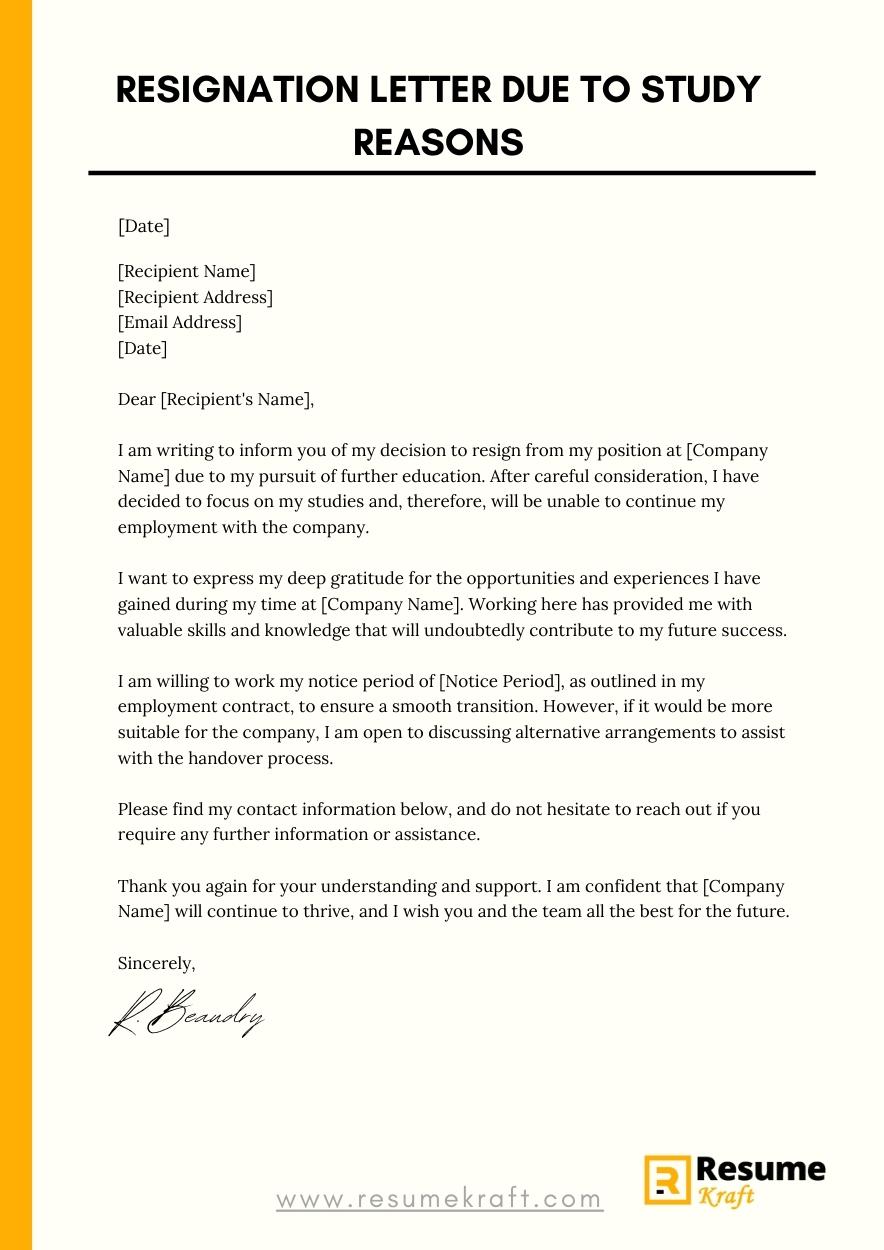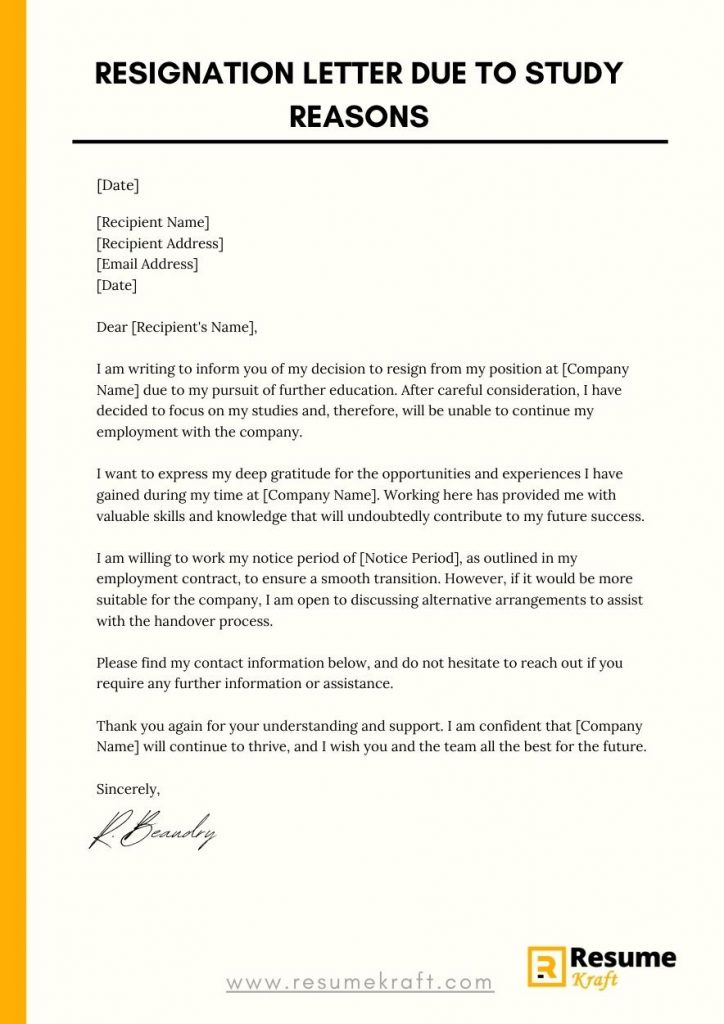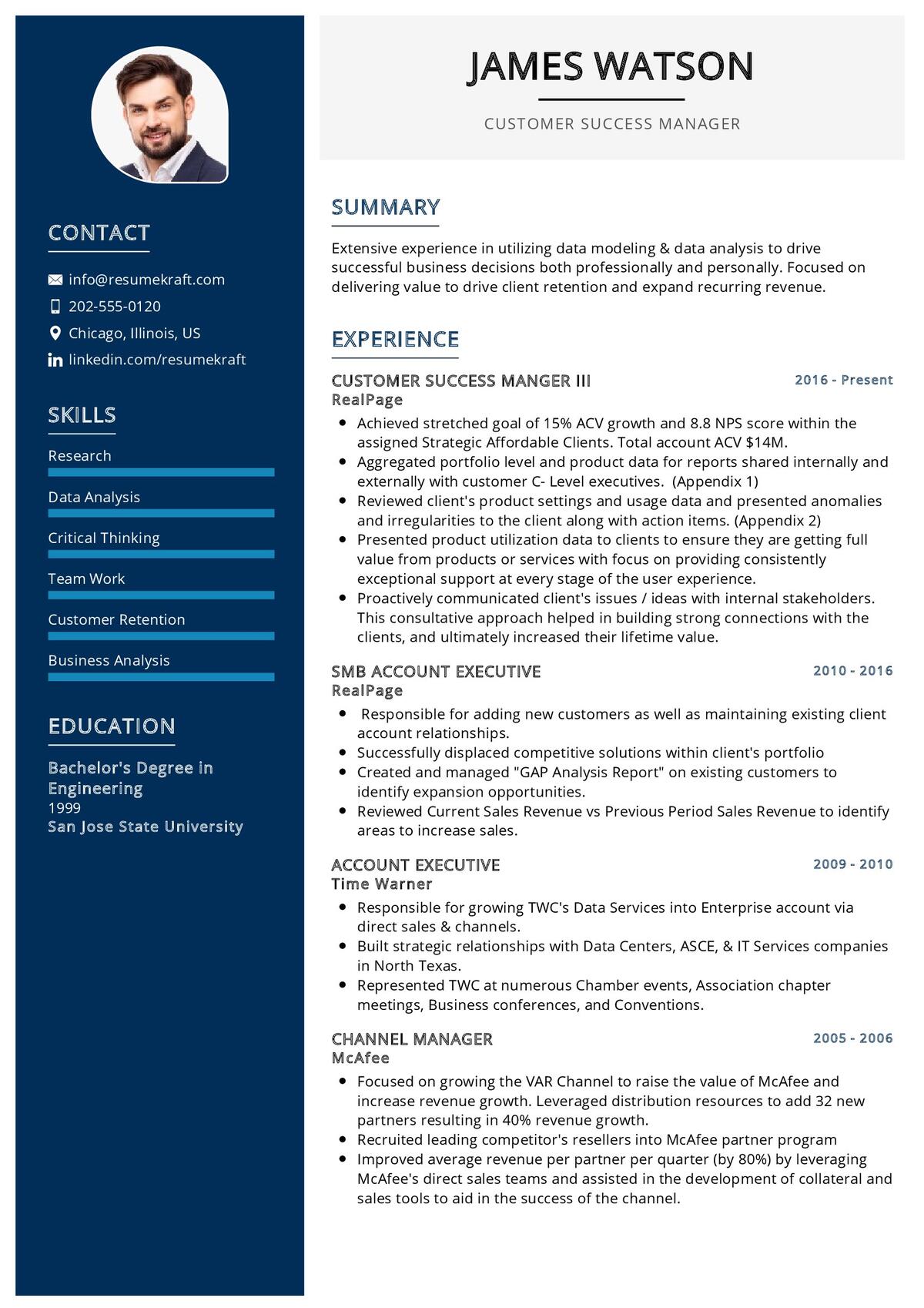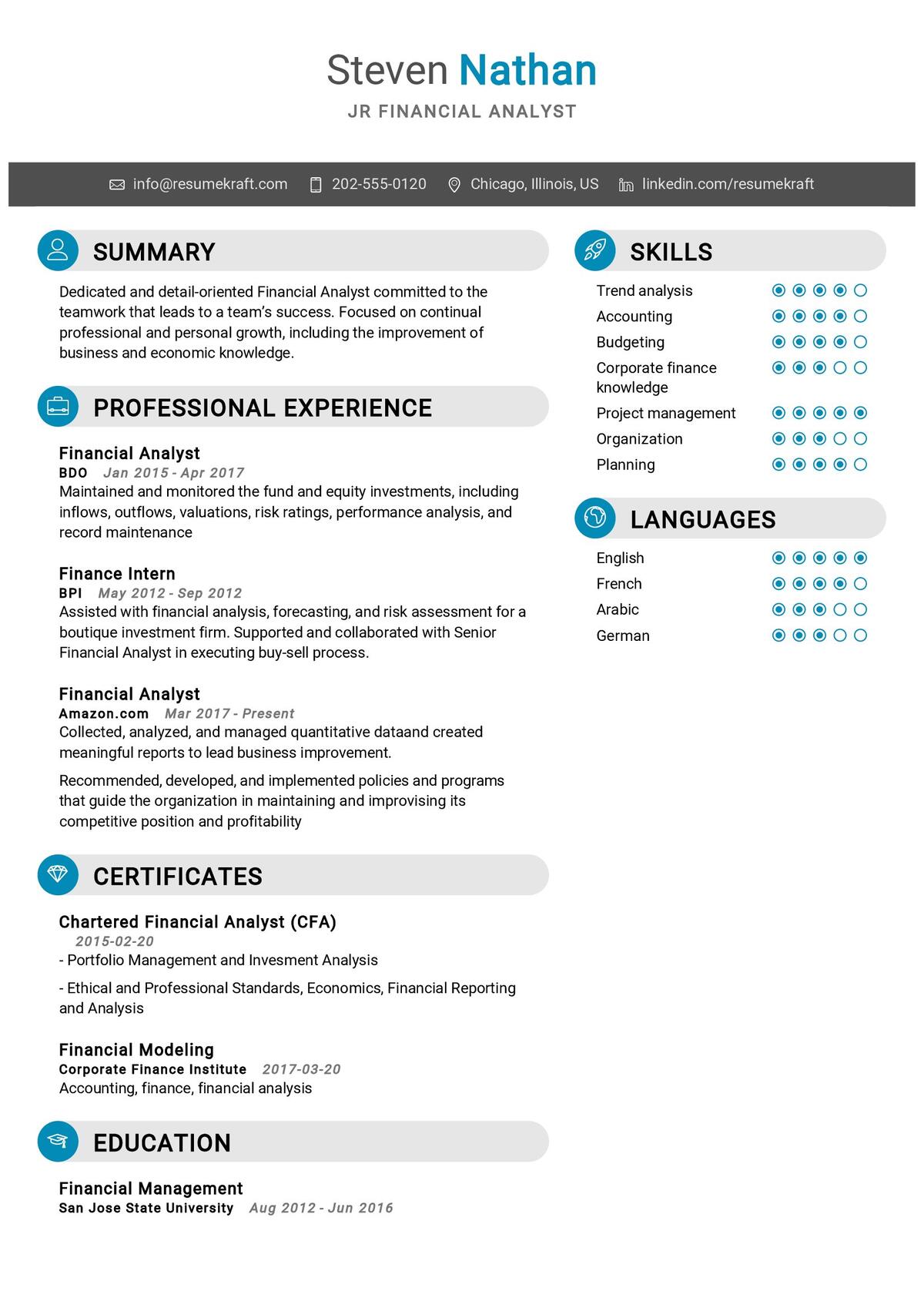
Are you considering resigning from your job due to study commitments? Writing a professional resignation letter is an important step in leaving your job on good terms. In this guide, we will provide you with tips on what to include, what not to include, and how to format a resignation letter specifically for study reasons. We will also provide you with sample resignation letters to help you get started.
- What To Include in a Resignation Letter
- What Not to Include in Your Resignation Letter
- How To Format a Resignation Letter
- Resignation Letter Due to Study Reasons Sample
- Email Resignation Letter Example
- Formal Resignation Letter Due to Study Reasons
- Resignation Letter with Gratitude Due to Further Studies
- Short and Polite Resignation Letter Due to Study Commitments
- Key Takeaways
- Frequently Asked Questions
- Conclusion
What To Include in a Resignation Letter
When writing a resignation letter due to study reasons, there are certain elements you should include to ensure a clear and professional communication of your intentions.
- Greeting: Start your letter with a formal greeting, addressing it to your supervisor or manager.
- Statement of Intent: Clearly state your intention to resign from your position due to study commitments. Explain that you have made the decision to prioritize your education and need to leave your current job to focus on your studies.
- Gratitude: Express your gratitude to your employer for the opportunities and experiences you have gained while working at the company. Highlight any valuable skills or knowledge you have acquired during your time there.
- Notice Period: Indicate your willingness to work your notice period, if applicable. If you are unable to work the full notice period, explain the reasons behind it and offer alternative solutions, such as helping with the transition or training a replacement.
- Contact Information: Include your contact information, such as your phone number and email address, so that your employer can easily reach you if needed.
- Positive Closing: End your letter on a positive note, expressing your hope for the company’s continued success.
What Not to Include in Your Resignation Letter
While it’s important to communicate your reasons for resigning, there are a few things you should avoid including in your resignation letter:
- Negative Remarks: Avoid making negative comments about your employer or colleagues. Maintaining a positive tone will help ensure a smooth transition.
- Excessive Details: Keep your resignation letter concise and to the point. Avoid going into unnecessary details about your study plans or personal circumstances.
- Demands or Expectations: It is not appropriate to use your resignation letter as a platform to make demands or express expectations. Focus on your reasons for resigning and express your gratitude instead.
How To Format a Resignation Letter
When formatting your resignation letter, it’s important to adhere to a professional and formal style. Here is a recommended format for your resignation letter:
- Your Contact Information: Include your full name, address, phone number, and email address at the top of the letter.
- Date: Add the date of writing below your contact information.
- Recipient’s Information: Include the recipient’s name, title, company name, and address.
- Salutation: Start your letter with a formal salutation, addressing the recipient by their name (e.g., “Dear [Supervisor’s Name]”).
- Body: Write a clear and concise body to express your resignation, including the mentioned elements from earlier (statement of intent, gratitude, notice period, etc.).
- Closing: End your letter with a professional closing, such as “Sincerely” or “Best regards,” followed by your full name and signature.
Resignation Letter Due to Study Reasons Sample
Here is a sample resignation letter due to study reasons that you can use as a template for your own letter:
Printed Resignation Letter Sample

[Your Name]
[Your Address]
[City, State, ZIP Code]
[Phone Number]
[Email Address]
[Date]
[Supervisor’s Name]
[Supervisor’s Title]
[Company Name]
[Company Address]
Dear [Supervisor’s Name],
I am writing to inform you of my decision to resign from my position at [Company Name] due to my pursuit of further education. After careful consideration, I have decided to focus on my studies and, therefore, will be unable to continue my employment with the company.
I want to express my deep gratitude for the opportunities and experiences I have gained during my time at [Company Name]. Working here has provided me with valuable skills and knowledge that will undoubtedly contribute to my future success.
I am willing to work my notice period of [Notice Period], as outlined in my employment contract, to ensure a smooth transition. However, if it would be more suitable for the company, I am open to discussing alternative arrangements to assist with the handover process.
Please find my contact information below, and do not hesitate to reach out if you require any further information or assistance.
Thank you again for your understanding and support. I am confident that [Company Name] will continue to thrive, and I wish you and the team all the best for the future.
Sincerely,
[Your Name]
Email Resignation Letter Example
If you prefer to send your resignation letter via email, here is an example:
Subject: Resignation – [Your Name]
Dear [Supervisor’s Name],
I hope this email finds you well. I am writing to officially tender my resignation from my position at [Company Name] due to my decision to pursue further studies. I have thoroughly enjoyed my time working with the company and have learned a great deal during my tenure.
I understand the importance of a proper notice period, and I am willing to work my notice period of [Notice Period] to facilitate a smooth transition. If it would be more convenient for the company, I am open to discussing alternate arrangements to ensure a seamless handover of my responsibilities.
I would like to express my heartfelt gratitude for the opportunities and support provided by [Company Name]. The experiences gained here have greatly contributed to my personal and professional growth.
Please find my contact information below, should you require any additional information or references:
[Your Name]
[Phone Number]
[Email Address]
Thank you for your understanding and support. I remain confident that [Company Name] will continue to thrive, and I wish you and the entire team the very best.
Best regards,
[Your Name]
Formal Resignation Letter Due to Study Reasons
Subject: Resignation – [Your Name]
Dear [Supervisor’s Name],
I hope this letter finds you well. I am writing to formally resign from my position as [Your Job Title] at [Company Name], effective [Last Working Day, typically two weeks from the date of the letter]. The decision to resign was not an easy one, but I have decided to pursue further studies, which requires my full attention and commitment.
I have thoroughly enjoyed working at [Company Name], and I am grateful for the opportunities for growth and the support provided by the company and my colleagues. This has been an enriching experience, and I truly appreciate the chance to contribute to the team.
I will ensure a smooth transition during my remaining time here and am more than willing to assist with the handover of my responsibilities to ensure that my departure does not cause any disruption.
Thank you again for the guidance and encouragement throughout my time here. I look forward to staying in touch and hope our paths cross again in the future.
Sincerely,
[Your Name]
Resignation Letter with Gratitude Due to Further Studies
Subject: Resignation – [Your Name]
Dear [Manager’s Name],
I am writing to formally notify you of my resignation from the position of [Your Job Title] at [Company Name], effective [Last Working Day]. The reason for my resignation is that I have decided to return to school to further my education, which will require my full-time commitment.
This decision was not made lightly, as I have truly enjoyed my time working at [Company Name]. The experience and knowledge I have gained here will undoubtedly serve me well as I continue my educational journey. I am incredibly grateful for the support and mentorship I have received during my tenure.
Please let me know how I can assist in the transition process to ensure everything continues to run smoothly after my departure. I want to make this process as seamless as possible for both the team and the company.
Thank you once again for all the opportunities and for making my time here truly memorable.
Warm regards,
[Your Name]
Thank you for your understanding and support. I remain confident that [Company Name] will continue to thrive, and I wish you and the entire team the very best.
Best regards,
[Your Name]
Short and Polite Resignation Letter Due to Study Commitments
Subject: Resignation – [Your Name]
Dear [Supervisor’s Name],
I hope you are well. I am writing to inform you of my resignation from my position as [Your Job Title] at [Company Name], effective [Last Working Day]. I am leaving to pursue my academic studies, which require my full attention.
It has been a pleasure working with you and the entire team. I have learned a great deal and appreciate the opportunities I have been given during my time here.
Please let me know if I can be of any assistance during the transition period. Thank you for your understanding.
Sincerely,
[Your Name]
Key Takeaways
Writing a resignation letter due to study reasons is an important step in leaving your job on good terms. Remember to include a clear statement of intent, express gratitude, offer willingness to work notice period, and maintain a positive tone throughout the letter. Choose a format that suits your preference, whether it be a printed letter or an email. Use the provided sample letters as a guide, but tailor the content to your specific circumstances.
Planning to Write a Resume?
Check our job winning resume samples


Frequently Asked Questions
What is the purpose of a resignation letter?
A resignation letter serves as a formal notification of your intention to leave your job. It creates a record of your decision to resign and helps maintain a professional relationship with your current employer.
How much notice should I give in a resignation letter due to study reasons?
Ideally, you should give as much notice as possible to allow your employer time to find a replacement. However, if your study program is starting soon, it is understandable that you may have limited time. Offer alternatives, such as assisting with the transition or providing documentation to help ease the process.
Should I mention my study plans in detail?
While it is important to mention your study plans, it is not necessary to go into excessive detail. Keep the focus on your decision to prioritize your education and explain that you are unable to continue working due to study commitments.
Should I include negative comments about my employer or colleagues?
It is best to maintain a positive and professional tone in your resignation letter. Avoid including negative comments or complaints about your employer or colleagues. Focus on expressing gratitude and discussing your study commitments.
Is it necessary to send a printed resignation letter?
In most cases, it is not necessary to send a printed resignation letter. An email resignation letter is generally acceptable, as long as it follows a professional format and tone. However, if you feel it is appropriate or preferred by your employer, you can opt for a printed letter.
Conclusion
Writing a resignation letter due to study reasons can be a challenging task. However, by following the guidelines provided and using the sample resignation letters as a reference, you can ensure a professional and respectful resignation process. Remember to maintain a positive tone, express gratitude, and offer assistance during the transition period. Best of luck with your studies and future endeavors!

